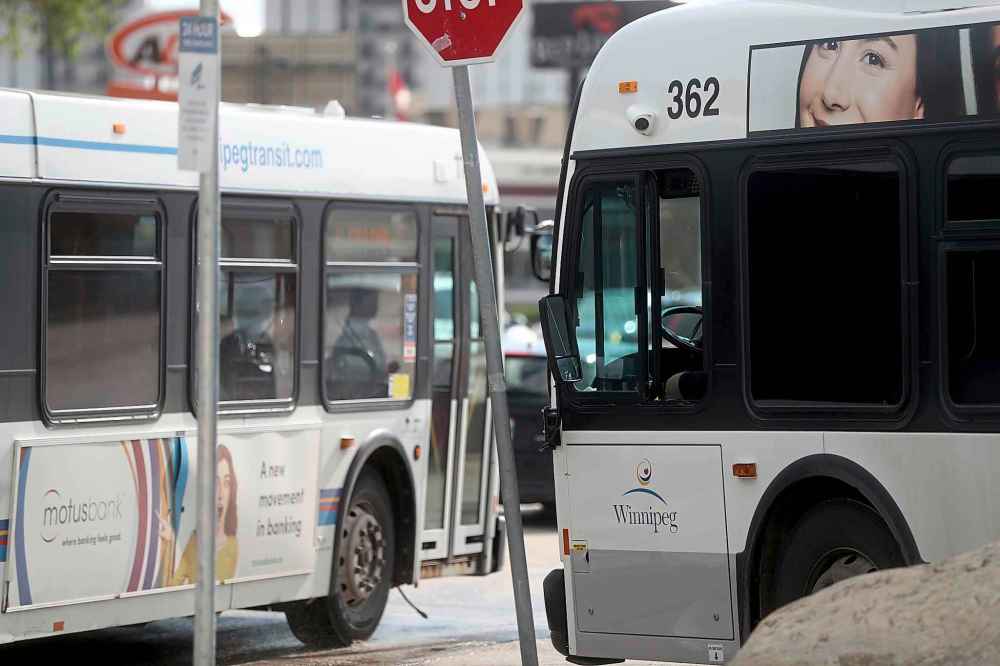Outward-facing cameras on city buses keep electronic eye on Winnipeg streets Police, MPI access footage for investigations
Read this article for free:
or
Already have an account? Log in here »
To continue reading, please subscribe:
Monthly Digital Subscription
$0 for the first 4 weeks*
- Enjoy unlimited reading on winnipegfreepress.com
- Read the E-Edition, our digital replica newspaper
- Access News Break, our award-winning app
- Play interactive puzzles
*No charge for 4 weeks then price increases to the regular rate of $19.00 plus GST every four weeks. Offer available to new and qualified returning subscribers only. Cancel any time.
Monthly Digital Subscription
$4.75/week*
- Enjoy unlimited reading on winnipegfreepress.com
- Read the E-Edition, our digital replica newspaper
- Access News Break, our award-winning app
- Play interactive puzzles
*Billed as $19 plus GST every four weeks. Cancel any time.
To continue reading, please subscribe:
Add Free Press access to your Brandon Sun subscription for only an additional
$1 for the first 4 weeks*
*Your next subscription payment will increase by $1.00 and you will be charged $16.99 plus GST for four weeks. After four weeks, your payment will increase to $23.99 plus GST every four weeks.
Read unlimited articles for free today:
or
Already have an account? Log in here »
Hey there, time traveller!
This article was published 17/07/2019 (2339 days ago), so information in it may no longer be current.
Video surveillance from the vantage points of transit bus drivers has become an investigative tool for Winnipeg police and insurance investigators when they’re trying to find out exactly what’s happening on city streets.
Cameras mounted on Winnipeg Transit buses don’t just capture the inside of the bus. They offer a view of what’s going on in front and toward the rear of the bus, and those are the viewpoints investigators look for when they’re digging into a crime or a crash that happened along the bus route.
More than a hundred times a year, the Winnipeg Police Service accesses audio or video footage collected via transit buses, according to statistics the city provided to the Free Press Wednesday.

WPS and Manitoba Public Insurance are the only two agencies that have requested the footage, a Winnipeg Transit spokeswoman said, and the city has granted all of the requests.
So far this year, the police force has requested transit footage 135 times, on track to meet last year’s total of 236 requests. There were 177 requests in 2017.
Insurance adjusters trying to find out who’s at fault in motor-vehicle collisions have accessed surveillance footage from transit buses four times this year. They did the same four times last year and 18 times in 2017. MPI spokesman Brian Smiley said the adjusters typically want to see what happened in front of the bus.
Transit collects and shares the video footage according to its own policy, which was put in place after the use of video cameras expanded throughout Winnipeg Transit’s 535-bus fleet in 2008. The policy states the footage may be downloaded and shared with the police. If it’s not downloaded, the video is recorded over after 10 days.
“It is an investigative option that is available to officers as part of their duties, similar to requesting footage from private businesses, home-owners or other City agencies such as the Traffic Management Centre.” – Const. Jay Murray
The office of Manitoba’s Ombudsman was consulted on the policy before it was implemented. In a statement Wednesday, a spokeswoman for the Ombudsman said the office hasn’t received any concerns or complaints about transit’s video surveillance. She noted Manitoba law allows public bodies to collect personal information for “law enforcement purposes or crime prevention.”
These kinds of surveillance policies have to balance privacy with public safety, says a privacy lawyer who served as British Columbia’s information and privacy commissioner.
“I think most privacy commissioners would be skeptical about an argument that, ‘well, we’re going to put cameras all over buses because they roam around the city and it will provide us a convenient way of providing video surveillance in case the police want it.’ I think there’d be a lot of skepticism about that. They would want to see a necessity argument based on good evidence,” David Loukidelis said.
“If it happens to be that a bus captured a shooting on the street somewhere where it was passing by with a camera, that is the kind of situation where they’d want to make sure the police request it,” and it’s released properly according to privacy laws, he said.
Criminal cases unrelated to public transit have made their way through court in Manitoba in which police have reviewed buses’ surveillance footage to help their investigations.
A WPS spokesman said the police service doesn’t keep track of how many of its requests are for interior or exterior-facing transit surveillance. In an email, Const. Jay Murray wrote police don’t have a specific set of guidelines that dictate when to request video from buses.
“It is an investigative option that is available to officers as part of their duties, similar to requesting footage from private businesses, home-owners or other City agencies such as the Traffic Management Centre,” he wrote. “Officers are trained to analyze information and advance their investigations by working to obtain evidence. With that being said, every investigation is unique and can require different approaches.”
katie.may@freepress.mb.ca
Twitter: @thatkatiemay

Katie May is a general-assignment reporter for the Free Press.
Our newsroom depends on a growing audience of readers to power our journalism. If you are not a paid reader, please consider becoming a subscriber.
Our newsroom depends on its audience of readers to power our journalism. Thank you for your support.









.jpg?h=215)